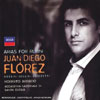Arias for Rubini
Hero worship…the phenomenal Flórez salutes the first operatic tenor superstar
View record and artist detailsRecord and Artist Details
Composer or Director: Vincenzo Bellini, Gaetano Donizetti, Gioachino Rossini
Genre:
Vocal
Label: Decca
Magazine Review Date: 12/2007
Media Format: CD or Download
Media Runtime: 72
Mastering:
Stereo
DDD
Catalogue Number: 475 9079

Tracks:
| Composition | Artist Credit |
|---|---|
| (Il) Pirata, Movement: Nel furor delle tempeste |
Vincenzo Bellini, Composer
Juan Diego Flórez, Tenor Roberto Abbado, Conductor Santa Cecilia Academy Orchestra, Rome Vincenzo Bellini, Composer |
| Elisabetta, Regina d'Inghilterra, Movement: ~ |
Gioachino Rossini, Composer
Gioachino Rossini, Composer Juan Diego Flórez, Tenor Roberto Abbado, Conductor Santa Cecilia Academy Orchestra, Rome |
| Marino Faliero, Movement: No, no, di abbandonarla senza un addio... di mia patria bel soggiorno |
Gaetano Donizetti, Composer
Gaetano Donizetti, Composer Juan Diego Flórez, Tenor Roberto Abbado, Conductor Santa Cecilia Academy Orchestra, Rome |
| (Il) Turco in Italia, Movement: ~ |
Gioachino Rossini, Composer
Gioachino Rossini, Composer Juan Diego Flórez, Tenor Roberto Abbado, Conductor Santa Cecilia Academy Orchestra, Rome |
| Bianca e Fernando, Movement: Tutti siam?... Odo il tuo pianto, o padre |
Vincenzo Bellini, Composer
Juan Diego Flórez, Tenor Roberto Abbado, Conductor Santa Cecilia Academy Orchestra, Rome Vincenzo Bellini, Composer |
| (La) Donna del lago, '(The) Lady of the Lake', Movement: Pace non trovo... Ah! come nascondere (1825 version) |
Gioachino Rossini, Composer
Gioachino Rossini, Composer Juan Diego Flórez, Tenor Roberto Abbado, Conductor Santa Cecilia Academy Orchestra, Rome |
| Guillaume Tell, Movement: Ne m'abandonne pas (Non mi lasciare) |
Gioachino Rossini, Composer
Gioachino Rossini, Composer Juan Diego Flórez, Tenor Roberto Abbado, Conductor Santa Cecilia Academy Orchestra, Rome |
Author: John Steane
In general, the great singers of the 19th century exist as names with which we have an uneasy familiarity backed by no very certain knowledge. Present-day celebrations help us clarify. Last year we had a concert in honour of Pauline Viardot, while Cecilia Bartoli recalls Maria Malibran (see page 109). Now the favourite tenor of Bellini and first superstar of his kind, Giovanni Rubini, is the subject of a recital by Juan Diego Flórez, who has compiled a programme which, for a start, may cause us to revise such hazy notions as we may have about Rubini's style of singing. My own idea, for instance, has been of a vocal embodiment of a characteristic Bellini melody: the sounds of a gently flowing loveliness, exquisite rather than robust, gracefully decorative and delicately nuanced. What we have here, by contrast, is predominantly energetic, brilliant and extrovert. Rubini is also reputed to have taken his high notes in a kind of head-voice or falsetto-mix. Flórez remains a tenor in full voice right up to the high E flat.
Flórez, then, is not trying to be Rubini; his title (“Arias for Rubini”) makes that clear. But the choice of programme also makes us think. None of the items is of the languishing, “exquisite” type, and the recital ends on a heroic note with Arnoldo's call to arms from Guglielmo Tell. This was not, in fact, written for Rubini, though he sang it - and are we to believe, then, that he sang all those high Cs in a head-voice and rallied the troops falsetto?
Flórez is, of course, quite phenomenal irrespective of any hypothetical comparison with Rubini. The precision, fluency and evenness, the firm placing of the voice and its ability to flourish in the extreme uplands of its range are a delight and continual source of wonder. He attends conscientiously to words and their meaning; he moderates the habitual brightness of his tone to suit the more reflective phrases. Yet, in “O muto asil”, for instance, he has not learnt to soften and sweeten as Tamagno did with his enormous voice or to infuse it with sadness as Martinelli did with his comparably incisive spinto.
Orchestra and chorus do much to add variety of tone and colour but I still find such sustained brilliance and brightness too much for a single session. There are seven items: I suggest one for each day of the week.
Flórez, then, is not trying to be Rubini; his title (“Arias for Rubini”) makes that clear. But the choice of programme also makes us think. None of the items is of the languishing, “exquisite” type, and the recital ends on a heroic note with Arnoldo's call to arms from Guglielmo Tell. This was not, in fact, written for Rubini, though he sang it - and are we to believe, then, that he sang all those high Cs in a head-voice and rallied the troops falsetto?
Flórez is, of course, quite phenomenal irrespective of any hypothetical comparison with Rubini. The precision, fluency and evenness, the firm placing of the voice and its ability to flourish in the extreme uplands of its range are a delight and continual source of wonder. He attends conscientiously to words and their meaning; he moderates the habitual brightness of his tone to suit the more reflective phrases. Yet, in “O muto asil”, for instance, he has not learnt to soften and sweeten as Tamagno did with his enormous voice or to infuse it with sadness as Martinelli did with his comparably incisive spinto.
Orchestra and chorus do much to add variety of tone and colour but I still find such sustained brilliance and brightness too much for a single session. There are seven items: I suggest one for each day of the week.
Discover the world's largest classical music catalogue with Presto Music.

Gramophone Digital Club
- Digital Edition
- Digital Archive
- Reviews Database
- Full website access
From £8.75 / month
Subscribe
Gramophone Full Club
- Print Edition
- Digital Edition
- Digital Archive
- Reviews Database
- Full website access
From £11.00 / month
Subscribe
If you are a library, university or other organisation that would be interested in an institutional subscription to Gramophone please click here for further information.




